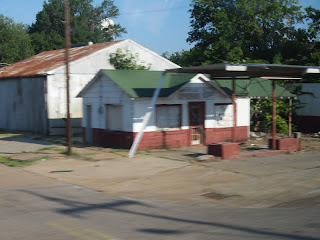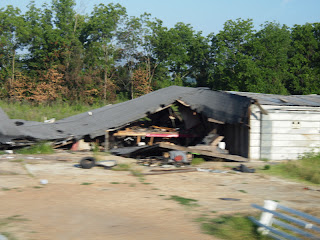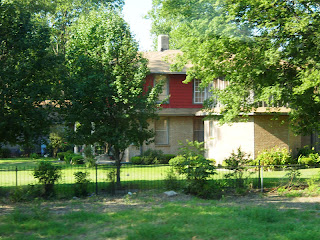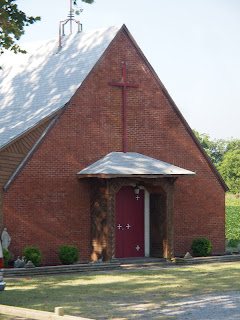Mound Bayou, Mississippi

Gentle Reader,
We journeyed to Mound Bayou, a community founded by ex-slaves in 1887. There is a strong connection to the philosophy of the founder of New Harmony, Indiana, which was set up by Robert Owen. Scott and I were just in New Harmony a couple weeks ago, seeing God of Carnage at the playhouse there. It is the town with the meditative labyrinth...
We were greeted by Mayor Johnson when we entered Mound Bayou. He hopped onto our bus, our "traveling classroom," and talked to us about some of the history and current happenings in Mound Bayou. He's been the mayor since 2001, and this is the greeting he offers to folks on the Mound Bayou website:
Welcome to Mound Bayou, Mississippi. Since 1887, the city of Mound Bayou has been committed to supporting citizens around the world. We are a full service community, having a Police Department, schools, health center, parks, housing, and grocery stores.
Since joining the city family in July
2001, my wife and I have always enjoyed living here in Mound Bayou. I invite you
to explore our website and see what we have to offer. I would also encourage you
to come and visit Mound Bayou and experience firsthand the southern hospitality
of life in Mound Bayou. We think you will see quickly why Mound Bayou will be a
place you would call home. I hope to meet you soon.
Best Wishes,
Mayor Kennedy Johnson
Best Wishes,
Mayor Kennedy Johnson
Isaiah T. Montgomery

In the 1820's, influenced by the philosophy of Robert Owen on utopian communities,Joseph Davis (brother of Jefferson Davis) decided to create a model slave community on his plantation. This was an incredibly radical idea, as many of the jobs that were usually assigned to whites were given to blacks on the planation. Robert Owen believed that human nature was not endowed by blood, that no one was or should be automatically assigned a station in life based only on birth (nobility, poverty, merchant class, etc...). Instead, he believed that people were products of their experience. Further, he believed that if one allowed people to lead good lives, they will lead good lives. As a result, Davis conducted a radical experiment on his plantation, offering much more humane conditions for
the workers. They were not housed under cheap conditions; instead, there were "comfy green spaces" for habitation. Education was encouraged on the plantation, Davis hired the best teachers for the workers, and Davis even sent his own children to the classrooms he established. After the Civil War, Davis sold his property to former slave Benjamin Montgomery, who had run a store and been a prominent leader in the Davis Bend community, where Mound Bayou traces its origin.
According to the City of Mound Bayou website, here's a thumbnail sketch of more of the history of this town: Benjamin Montgomery's son,Isaiah T. Montgomery, along with Benjamin Green led the founding of Mound Bayou in 1887 in wilderness in northwest Mississippi. The bottomlands of the Delta were a relatively undeveloped frontier, and blacks had a chance to clear land and acquire ownership in such areas. I. T. Montgomery led the village through the 1920s. As cotton prices fell, the town suffered a severe economic decline in the 1920s and 1930s.
Mound Bayou began to revive in 1942 after the opening of the Taborian Hospital by the International Order of Twelve Knights and Daughters of Tabor, a fraternal organization. For more than two decades, the hospital provided low-cost health care to thousands of blacks in the Mississippi Delta. The chief surgeon was Dr. T.R.M. Howard who eventually became one of the wealthiest blacks in the state. Howard owned a plantation of more than one thousand acres, home-construction firm, small zoo and built the first swimming pool for blacks in Mississippi. In 1952, Medgar Evers moved to Mound Bayou to sell insurance for Howard's Magnolia Mutual Life Insurance Company.
Throughout the years, Mound Bayou has continued its long tradition of community self-empowerment that has produced numerous African American leaders, innovators, and proud family lineages. Mound Bayou has always been a model city for the capabilities of African-Americans to rise above inequality in the South. The town has never practiced or experienced segregation within its borders. Mound Bayou is a town without second class citizens.
This is the Taborian Hospital today, which is just a front shell of its former construction
Mound Bayou, in its prime, became a center of black culture and pride. The Montgomery Family became one of the top cotton producers in the world. After the Civil War, Mound Bayou became a sanctuary for former slaves. In essence, this community was a mirror image of the Jim Crow South.
We asked Mayor Johnson about the population today, wondering if the town is a mix of whites and blacks. The town has remained largely black, with seven white residents.
Here are some additional images from Mound Bayou today...
Mayor Johnson, chatting us up on our traveling classroom
The Sisters of Mercy do a great deal of good works in and around Mound Bayou. Apparently, they love to sing and dance and generally live a rollicking good life! At the end of the workshop, the NEH participants decided to pass the hat and collect some funds to contribute to the good work these fine sisters continue to do in the community...
Robert Owen had a very idealistic yet practical vision about humanity. I'd like to conclude this blog entry with some of his ideas...
"Eight hours' daily labour is enough for
any human being, and under proper arrangements sufficient to afford an ample
supply of food, raiment and shelter, or the necessaries and comforts of life,
and for the remainder of his time, every person is entitled to education,
recreation and sleep". (From the Foundation Axioms of Owen's "Society for
Promoting National Regeneration", 1833)
"Women will be no longer made the slaves of, or dependent upon men…. They will be equal in education, rights, privileges and personal liberty". (Book of the New Moral World: Sixth Part, 1841)
"None of the inhabitants of same village shall injure any of the fences about it, or upon the farm, whether stone, dyke, railings, or hedges; nor any of the houses, ground, or plantings, nor any of the company's property, of whatever nature it may be; but, on the contrary, when they see children or others committing such damage, they shall immediately cause them to desist from it, or if that shall not be in their power, give notice at the principal counting-house of the offences, and who are the offenders".
"As there are a very great variety of religious sects in the world (and which are probably adapted to different constitutions under different circumstances, seeing there are many good and conscientious characters in each), it is particularly recommended, as a means of uniting the inhabitants of the village into one family, that while each faithfully adheres to the principles which he most approves, at the same time all shall think charitably of their neighbours respecting their religious opinions, and not presumptuously suppose that theirs alone are right".
(all of above from the Rules and Regulations for the Inhabitants of New Lanark, 1800)
"It is therefore, the interest of all, that every one, from birth, should be well educated, physically and mentally that society may be improved in its character, - that everyone should be beneficially employed, physically and mentally, that the greatest amount of wealth may be created, and knowledge attained, that everyone should be placed in the midst at those external circumstances, that will produce the greatest number of pleasurable sensations, through the longest life, that man may be made truly intelligent, moral and happy, and be, thus, prepared to enter upon the coming Millennium". (A Development of the Principles & Plans on which to establish self-supporting Home Colonies, 1841)
Robert Owen was truly a humanitarian and a visionary. Walking around New Harmony, Indiana, I felt a deep sense of peace and tranquility. It is fascinating to me to read about his ideas, many of which are commenting on the coming millennium of 1900. We could learn much from him as we move forward in the 21st century...
 |
Robert Owen... on a quest for universal harmony
Namaste,
Marianne


























No comments:
Post a Comment